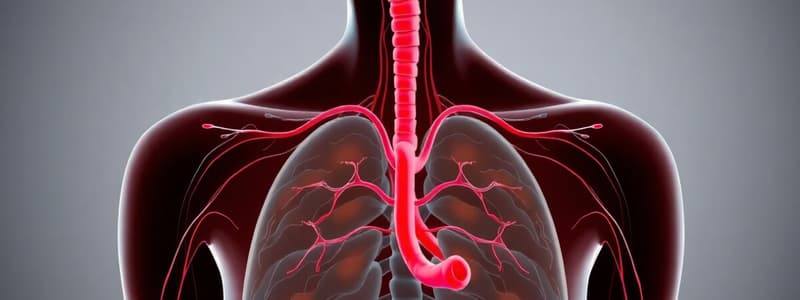Podcast
Questions and Answers
Which of the following is NOT a function of the endocrine system?
Which of the following is NOT a function of the endocrine system?
- Influencing mood
- Regulating reproductive processes
- Regulating growth and development
- Controlling digestion (correct)
Which hormone is released by the pancreas and regulates blood sugar levels?
Which hormone is released by the pancreas and regulates blood sugar levels?
- Growth Hormone
- Adrenaline
- Insulin (correct)
- Thyroxin
What is the main difference between the endocrine system and the nervous system in terms of signal transmission?
What is the main difference between the endocrine system and the nervous system in terms of signal transmission?
- The endocrine system uses chemical signals, while the nervous system uses a combination of electrical and chemical signals.
- The endocrine system uses chemical signals, while the nervous system uses electrical signals. (correct)
- The endocrine system uses electrical signals, while the nervous system uses chemical signals.
- The endocrine system uses electrical signals, while the nervous system uses a combination of electrical and chemical signals.
Which gland is responsible for regulating calcium levels in the body?
Which gland is responsible for regulating calcium levels in the body?
What is the condition called when the body doesn't produce the right amount of hormones?
What is the condition called when the body doesn't produce the right amount of hormones?
What is one of the key functions of hormones in the body?
What is one of the key functions of hormones in the body?
Which of the following is NOT a disorder that can be caused by an imbalance in the endocrine system?
Which of the following is NOT a disorder that can be caused by an imbalance in the endocrine system?
Which of the following is NOT a long-term effect of hormones?
Which of the following is NOT a long-term effect of hormones?
What is a key difference between the male and female reproductive systems?
What is a key difference between the male and female reproductive systems?
What is the main reason for human reproduction?
What is the main reason for human reproduction?
Flashcards
Endocrine System
Endocrine System
A system of glands that secrete hormones for regulation of body functions.
Hormones
Hormones
Chemicals released by glands that affect various body functions.
Pituitary Gland
Pituitary Gland
The gland at the brain's base that controls other glands and growth.
Thyroid Function
Thyroid Function
Signup and view all the flashcards
Adrenaline
Adrenaline
Signup and view all the flashcards
Reproductive Glands
Reproductive Glands
Signup and view all the flashcards
Hormonal Imbalance
Hormonal Imbalance
Signup and view all the flashcards
Puberty
Puberty
Signup and view all the flashcards
Sexual Reproduction
Sexual Reproduction
Signup and view all the flashcards
Study Notes
The Endocrine System
- The endocrine system is made up of glands that release hormones into the bloodstream
- Hormones affect almost all cells, organs, and bodily functions
- Hormones regulate growth, development, metabolism, and reproductive processes
- Endocrine glands secrete hormones
- Hormones travel throughout the body
- Hormones trigger a response in target organs
- Endocrine responses can take a few hours or even weeks
Endocrine Glands and Their Hormones
- The endocrine system consists of glands that release hormones into the body
- Each gland has specific functions, locations, and hormones produced
- Pituitary gland: Located at the base of the brain; stimulates growth, controls functions of other glands; releases oxytocin, vasopressin, growth hormone, ACTH, prolactin, FSH
- Thyroid gland: Located below the voice box; regulates body metabolism and calcium storage in bones; releases thyroxine, calcitonin
- Parathyroid gland: Located in the neck; controls calcium levels and normalizes bone growth; releases parathyroid hormone
- Thymus gland: Located in front of the heart; enables the body to produce certain antibodies; releases thymosin
- Adrenal glands: Located on top of the kidneys; prepares the body for action by controlling heart rate, breathing; releases adrenaline
- Pancreas: Located between the kidneys; regulates blood sugar levels; releases insulin, glucagon
- Reproductive glands (Testes): Located in the lower abdomen of males; controls male characteristics, maturation; releases androgens, testosterone, estrogen
- Reproductive glands (Ovaries): Located in the lower abdomen of females; influences female traits, supports reproductive function; releases progesterone
Effects of Hormones on the Body
- Hormones coordinate body processes
- Hormones regulate organ, tissue, and cell function
- Hormones impact growth, appearance, emotions and reproductive functions
- Hormones have both short-term and long-term effects
- Hormonal changes occur during puberty
- Hormonal imbalance can cause health problems
The Reproductive System
- The reproductive system is controlled by hormones
- Reproduction is essential for species survival
- Human reproduction is complex
- Males and females have different reproductive systems, but they use similar structures sometimes
- Hormones regulate reproductive functions in both males and females.
Male Reproductive System Parts and Functions
- Testes: Produce sperm
- Scrotum: Holds the testes
- Penis: Deposits sperm
- Vas deferens/Urethra: Carry sperm
- Glands: Provide liquid for sperm
Female Reproductive System Parts and Functions
- Ovaries: Produce egg cells
- Oviducts (Fallopian tubes): Passageway for eggs
- Uterus: Site of implantation and fetal development
- Vagina: Receives the penis
- Hormones regulate reproductive functions in both males and females
The Menstrual Cycle
- The monthly cycle in females
- Ovaries release eggs
- Hormones control egg release, uterine lining changes
- Cycle involves maturation of the egg, releasing of the mature egg, and uterine lining preparation.
- If the egg is not fertilized, the uterine lining is shed.
Studying That Suits You
Use AI to generate personalized quizzes and flashcards to suit your learning preferences.




